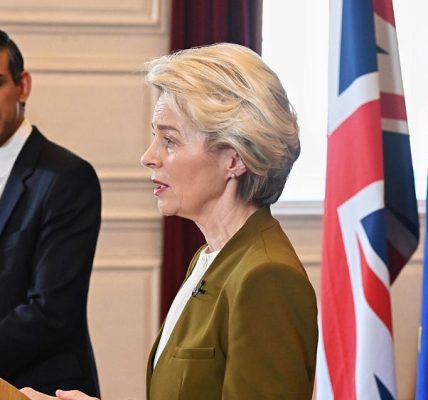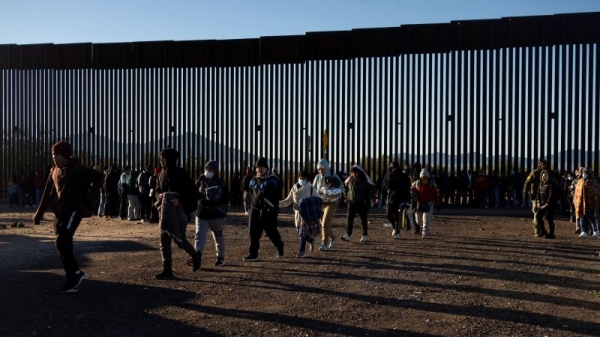These young Michigan voters are divided on Biden’s handling of the Israel-Hamas war and aren’t guaranteeing him their votes
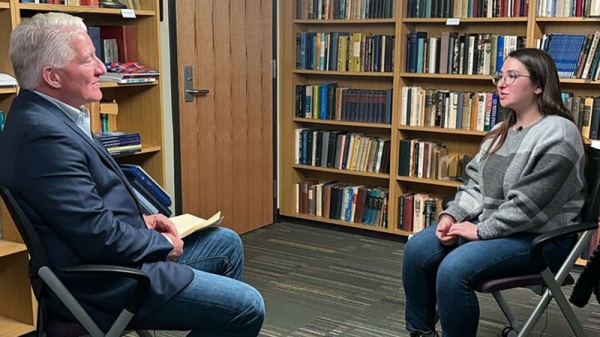
Midterms are over and finals are just ahead in a semester that included a big new experiment for Wayne State sophomore Maya Siegmann: “I joined the breakdancing club.”
“I’m learning a new skill,” Siegmann said with a smile. “That kind of shocks people a little bit. Unexpected. But it’s really fun.”
It is not, though, the biggest change for Siegmann this fall. She is active in the Jewish campus organization Hillel and her frequent visits to its lounge and library now include greeting the police officer standing watch outside. It is part of the new normal here since the October 7 Hamas terror attack on Israel.
“That we need to have a police officer outside the office, it is upsetting,” said the soft-spoken Siegmann, who’s studying to be a social worker.
“There is definitely a divide between the pro-Palestine students and the pro-Israel students,” said Siegmann. “The division is very clear. The tension on campus is very high.”
Wayne State is a sprawling 200-acre campus in downtown Detroit, a place that takes pride in being part of a great American city’s resurgence. The 24,000 students are a diverse melting pot and the urban location means campus politics tilt decidedly blue.
It is a community where support for abortion rights runs high. And LGBTQ rights. College costs come up a lot in conversations. The climate crisis, too. It is an issue mix that favors Democrats, and Wayne State is among campuses critical to President Joe Biden’s Michigan win in 2020 and big gains by Democrats here in 2022.
At the moment, though, there’s a Democratic divide over the Israel-Hamas conflict and Biden’s handing of the crisis. CNN recently visited Michigan as part of a new project designed to track the 2024 campaign through the eyes and experiences of voters in key areas – in this case, young voters.
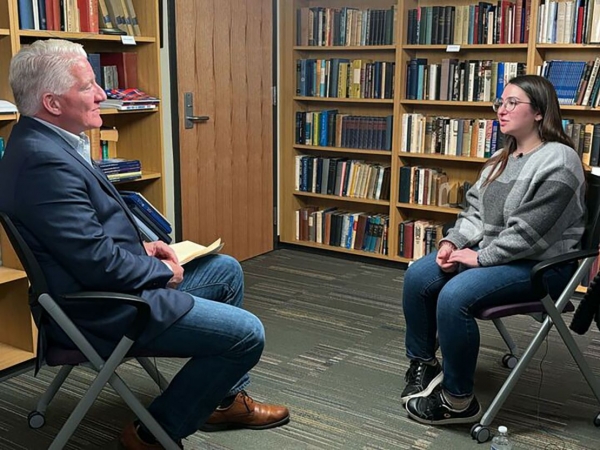
John King speaks with Wayne State University student Maya Siegmann, in Detroit.
CNN
“I am an Israeli Jewish Israeli American,” is how Siegmann describes herself. She took a break from campus to join last week’s march in support of Israel in Washington, DC – part of a very sudden shift to political activism.
“Politics is not something that really interests me,” she said. “But I am advocating for the Jewish population because I want to make other students feel more safe and more comfortable. Because that’s just, that’s not where we are right now.”
Siegmann hears the condemnation of Israel from friends and classmates, along with the calls for Biden to demand a ceasefire in Gaza because of the mounting toll on Palestinian civilians.
“A ceasefire is a way for Hamas to re-up their supplies,” she said. “A ceasefire will just allow them to resupply and attack at a later time.”
A lot of the conversations on campus – and on students’ social media – are black and white. Often lost in the anger and emotion is important nuance.
Siegmann, for example, said: “I stand with Israel. … Right now, the most important thing is defending their right to exist.”
But Siegmann takes issue with Prime Minister Benjamin Netanyahu on several issues, including corruption concerns and his handling of the Palestinians.
“I would just like to live in peace with our neighbors,” she said. “There are a lot of problems within Israel,” but for now she added, “That’s kind of on a side burner.”
Siegmann is happy with Biden’s handling of the crisis, but he isn’t guaranteed her vote next November, even though he won it in 2020.
“I think that there should be an age cap on people in office,” she said of the president, who turned 81 on Monday. “He is very supportive of Israel, which I’m very grateful for, but I would like someone who’s younger in office.”
Palestinian American who backed Biden in 2020 won’t do it again
First-year Wayne State law student Ibrahim Ghazal is another Biden 2020 voter whose support in 2024 is at risk, to say the least.
“Not in a million years would I like to vote for (Donald) Trump,” Ghazal said in an interview. “I don’t know if I am voting at all. But I definitely will not be voting for Biden.”
We asked Ghazal if he agreed with an image on the front page of an Arab American newspaper: activists holding “Abandon Biden” placards to illustrate a story harshly critical of the president’s handling of the crisis.
“To an extent, yes,” Ghazal said. “I feel as though President Biden does not value my life as a Muslim American as much as he values other lives.” The White House earlier this month announced the development of a national strategy to combat Islamophobia. And the president has urged Israel to exercise restraint in its response to minimize civilian deaths and ease humanitarian suffering. But Biden has rejected calls for a ceasefire, instead stressing his commitment to a two-state solution in a Washington Post op-ed over the weekend.
Ghazal lives in Detroit. But our conversation was in neighboring Dearborn, at a Yemeni coffee house where he often meets friends. Community is a passion of Ghazal’s, who founded the Detroit Muslim Running Club to build a healthier community in Michigan.
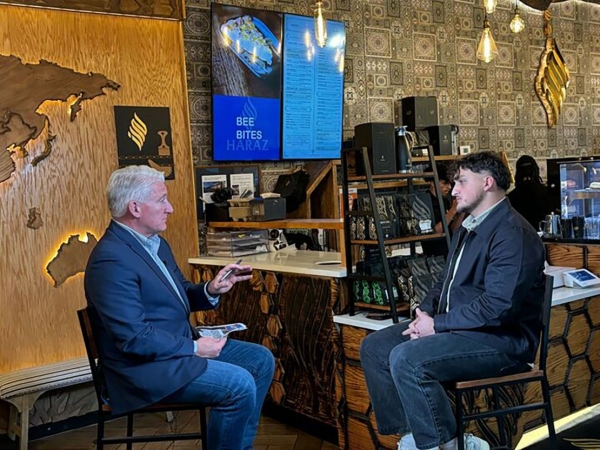
John King talks to Wayne State University Law School student Ibrahim Ghazal in Dearborn, Michigan.
CNN
More than half of Dearborn’s residents are of Arab ancestry and Biden won 74% of the city’s vote in 2020.
“What’s going to make him hear us is our vote,” Ghazal said. “That’s going to make a difference for him in a swing state.”
Ghazal’s views of Netanyahu are scathing, and he sees Biden as greenlighting an Israeli military campaign Ghazal calls disproportionate and indiscriminate.
“I’m Muslim. I’m American. I’m Palestinian,” is how Ghazal describes himself. “I care because I am an American and I don’t think our country should fund that type of a reaction.”
Ghazal is blunt.
“I’m speaking about an occupation – a brutal occupation that we fund,” he said.
Most of the international community, including the United States, considers Gaza, the West Bank, East Jerusalem and the Golan Heights to be occupied territories.
Ghazal called antisemitism “horrible” and “disgusting.”
But he also sees Islamophobia and ignorance at play in the criticism of Palestinians who condemn the Israeli military response.
“It’s disgusting that standing up for children dying and women dying and civilian infrastructure being destroyed is being compared to supporting Hamas,” Ghazal said. “Holding up a Palestinian flag does not support Hamas. Hamas has their own flag. Nobody’s carrying their flag.”
His long-term hopes align with those of Siegmann – though, like her, Ghazal sees only tense times ahead.
“All I want is a pathway to peace,” Ghazal said. “For Palestinians to reach a peaceful solution where Jews, Muslims and Christians and any person can live peacefully together.”
An 18-year-old looking for the next generation of leaders
Our visit to Michigan, and college campuses in Detroit and Ann Arbor, was part of our reporting project’s effort to check in with young voters, who were a vital piece of the Biden coalition in 2020 and were also part of a strong 2022 midterm year for Democrats in Michigan.
Summer Matkin could only watch then, but the 18-year-old is looking forward to casting her first votes in the 2024 cycle.
“I’m finally here and I’m able to vote,” said Matkin, a theater major in her first semester at Wayne State. “I registered over the summer.”
Matkin is an esports enthusiast and has used her film and social media skills to help raise money to fight hunger and for the Trevor Project, which provides support services to LGTBQ young people. She says she has not had time this first semester to join any of the campus protests, but “Free Palestine is something I would 100% believe in.”
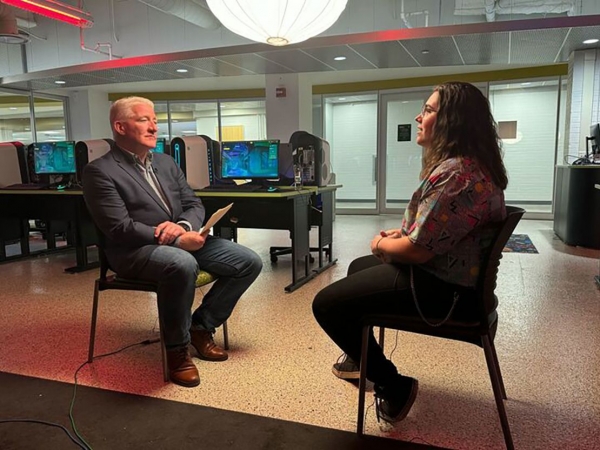
John King talks to Wayne State University student Summer Matkin in Detroit.
CNN
Matkin did not register with a political party but said, “My ideals lean more Democratic or liberal side.”
If there is a Trump-Biden rematch, “I’d go Biden,” Matkin said. But she would prefer younger candidates, and listed New York Democratic Rep. Alexandria Ocasio-Cortez as someone she’d like to see lead the party in the future.
“I feel like there’s a detachment for young people with an older president,” she said.
“I think there is a very weird separation or maybe generational gap, so, when there’s certain things we want to be heard as young people. … Not only the conflict out there with Israeli and Palestinian people but we also have student loan forgiveness and all of these different financial problems.”
Some students look toward third-party option
The University of Michigan’s main campus in Ann Arbor, with twice as many students as Wayne State, is also rife with tension.
About 40 students were arrested Friday night, according to the university.
The protest was organized by Students Allied for Freedom and Equality, a local chapter of the national group Students for Justice in Palestine.
The Friday protest at a school administration building was one of a series of demonstrations the group has organized. Another asked students to write the names of Palestinians killed in Gaza on a giant poster.
“We are in the middle of our fight for escalation with the administration,” said Joseph Fisher, a history major and a leader of the group. “One of our demands that we’re pressuring for right now is complete divestment from the state of Israel and weapons manufacturers that are complicit in the genocide that’s happening in Gaza.”
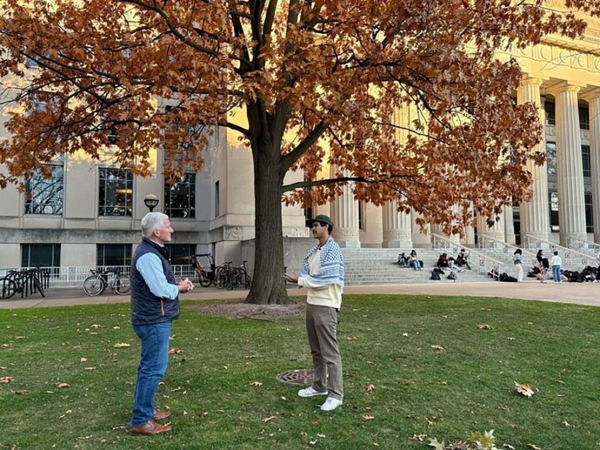
John King speaks with University of Michigan student Joseph Fisher in Ann Arbor, Michigan.
CNN
Fisher emphatically rejects the idea that Israel has a right to use military force to respond to a terrorist attack. “It is absolutely essential that we call it for what it is – a genocide – and also say that it didn’t start on October 7,” Fisher said. “It started in 1948 with the creation of the settler colonial state of Israel. … I think we as students in the United States, people from across the world and Palestinian freedom fighters are fighting for the liberation of their homeland. I think we need to say how it is.”
Tensions between Israelis and the Palestinians have existed since before Israel’s founding in 1948.
United Nations experts warned this weekend that “grave violations” against Palestinians in Gaza “point to genocide in the making.” But Israel rejects allegations of genocide and maintained that it has a right to defend itself, which Biden has supported. The White House has also pushed back on protesters who are accusing Israel of committing genocide, with National Security Council spokesperson John Kirby on Monday saying, “What Hamas wants, make no mistake about it, is genocide.”
Some Jewish students say language like Fisher’s – and beliefs like that – contribute to the spike in antisemitism.
Fisher was not in Michigan in 2020, when overwhelming support among college students helped Biden flip the state from red in 2016 back to blue. He was just 17 then, back in his native Georgia, where, out of fear of Trump, he volunteered to help the American Civil Liberties Union register voters.
Georgia was another flip and a pivotal win for Biden.
But Fisher, who is Black, will not be helping the president this time. Nor, at least as of today, will Biden get his first vote for president. Instead, Fisher said he is currently leaning toward supporting the Party for Socialism and Liberation.
“I haven’t seen any change in my life and the lives of other people marginalized in this country in the last four years,” he said. “I will not vote for Joe Biden at this time.”
The College Democrats at Ann Arbor try to meet weekly, and this past week’s focus was on political communication skills.
Seniors Anushka Jalisatgi and Jade Gray were part of the Democrats’ success on campus in 2020 and 2022, and they said interest in the organization is up, in part because of anger at the Supreme Court decision tossing out the landmark Roe v. Wade abortion rights ruling.
Until recently, their biggest challenge preparing for 2024 was questions about Biden’s age.
“Absolutely it comes out,” Gray said. “It’s a real point to make. It’s a real conversation to be had.”
Her strategy? Expand the focus.
“You’re not just voting for Biden,” Gray said. “You are voting for his entire administration. … You are voting for who he will appoint to the Supreme Court.”
Jalisatgi brings in the second prong.
“What’s more important is, when we look at, when we turn on the TV and we look at the Republican primary debate or we look at Donald Trump’s speeches and we see what our alternative is,” Jalisatgi said. “It really emphasizes to us that, you know, you’re not just voting for the top of the ticket. You are voting for so much more.”
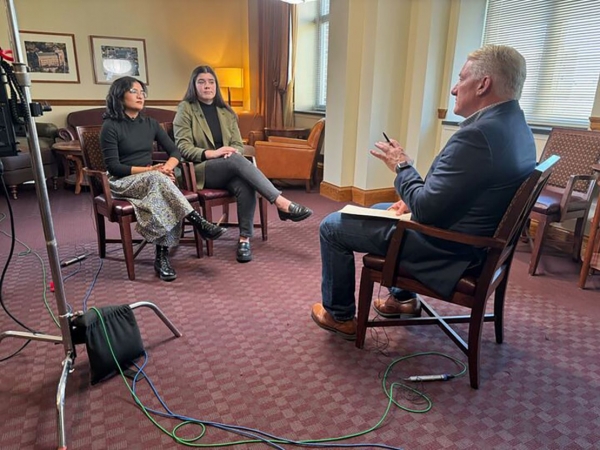
John King speaks with University of Michigan students Anushka Jalisatgi and Jade Gray in Ann Arbor, Michigan.
CNN
A Tufts University study after the 2022 midterms credited Michigan as the state with the highest turnout of voters ages 18-29.
Jalisatgi said her “ambitious goal” is to beat that turnout in 2024.
But both she and Gray acknowledged the Israel-Hamas crisis – and Biden’s response – were the source of considerable tension, and even talk of sitting out or looking for a third-party option next year.
“Some of them, yes, have shared with us that maybe this is making me reconsider,” Jalisatgi said.
Gray made clear her personal view. “You know, Mr. President, I’ve seen you take key humanitarian steps, but I think the next step is a ceasefire. And I think that would go a long way with voters.”
Their hope is that the national conversation is back to more favorable ground for Biden by next fall, and that those mad at the president now are more willing to look at the bigger picture then.
But things are raw at the moment.
Jalisatgi laughed and said “yes” when asked if she is glad the election is not tomorrow.
“We’re glad the election is not tomorrow because of how emotionally charged and deeply personal this is,” Gray added. “It’s hard right now.”


